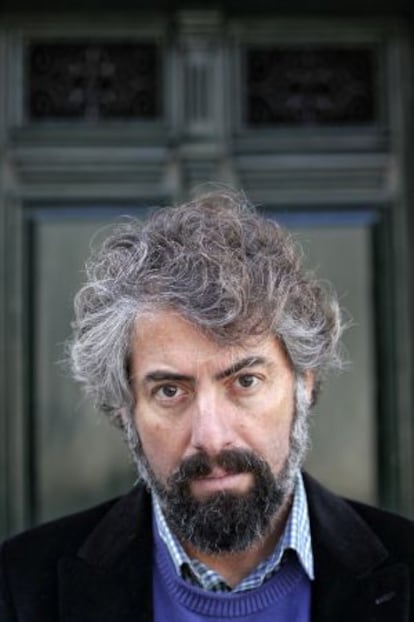"Love is an invention of poets and priests"
Seville-born musician Sr Chinarro discusses romance and the future of recorded music


It's pouring down in Madrid, and in the dingy bar Castilla, close to the capital's Chamartín railway station, the only music comes from the slot machine. Finally, Antonio Luque arrives, soaking wet, and apologizing: "Newcomers like me think that the Metro is a kind of matter transporter: we always get our calculations wrong." Luque, 43, who has released around a dozen recordings since the early 1990s under the alias Sr Chinarro, has left his native Seville for Madrid's trendy La Latina neighborhood. "If you're going to live in a different city, you might as well go to a place where there is something going on. That's always going to be better than just locking yourself in your house and complaining about everything," he says.
Luque formed Sr Chinarro in the early 1990s, releasing his debut track in a 1992 compilation called El Colectivo Karma. Mostly influenced by British alternative and goth rock, he has been recognized as one of the most interesting lyricists to have emerged out of the 1990s Spanish rock scene.
His latest album, Enhorabuena a los cuatro, was recorded in Madrid. It is his third record since 2011's Presidente, which he followed up a year later with ¡Menos samba!, the first double album of his prolific discography. Presumably driven by the current dire social and economic state of affairs in Spain, Luque's distinctive trenchant wit is at its most scathing in the album's 19 songs, which deal primarily with the many ills of the Spanish national psyche, often mocking traditional musical genres such as the sevillana and the habanera.
We are still hanging on to the idea of Romeo and Juliet: we spend our lives frustrated and unhappy"
Luque attributes his recent spurt of creativity to the social networks, "where anybody who has anything to say does so without thinking too much about it." He then makes it clear that his songs aren't tweets: "They require a lot of work, but let's be honest, putting out an album a year is no big deal. Soon we won't even be releasing discs of any kind. The song will be the only entity we think of, an act of communication, pure and simple."
Luque says he doesn't just like to poke fun at the Spanish psyche, but at the clichéd perceptions of love that he says still dominate songwriting. "One way of pointing out that the world is made up of common areas is to take the standard role model, break it, and put it back together again. Love is an invention of poets and priests, people who generally don't live in the real world. Which is why love doesn't work. We are still hanging on to the idea of Romeo and Juliet: we spend our lives frustrated and unhappy. What sort of approach is that to life?"
At the same time as he laughs at them, Luque draws on Spain's many traditional musical styles, from flamenco to the jota, to tell his tales of useless lovers and children getting ready for their first communion. "I do what I do," he says, unconcerned about the fans and critics, who want him to return to the simpler, less aggressive style of his first albums. "I like those songs more than they do, but that reaction is typical of this country: people come up to you and say how much they like you, but you can tell from their tone that the knife is coming out at any moment."
We call it piracy, but when it is accepted by the system it won't be called that"
Luque says that while he's fortunate to make a living from doing what he likes, making money out of music is getting harder. "People who like pop music don't buy records; and they only go to concerts to dance. I don't know if I like the idea of converting my music into a dancehall prostitute."
Enhorabuena a los cuatro includes a thank you to his record company for managing to get his album out "in a civilized manner," in whatever format. "It's a miracle," he says, "bearing in mind that people download everything these days. We call it piracy, but when it is accepted by the system it won't be called that. At this rate we'll be recording on our computers and posting our songs on the net straight away, but people forget that it is hard work and technically complex to record an album. People in this country need to understand that albums like those produced by Coldplay will only happen abroad, and that here all we'll have are demo tracks. But that is normal in a country of waiters and construction workers. The only solution is education, but the government is doing all it can to eradicate teaching the arts, never mind music."
He says he is seriously thinking about putting out his next album directly on the web through online music store Bandcamp so that his fans can finish the work. "I like the idea, it's like saying to people, 'If you're going to download it for free, you might as well do something useful.' It might sound like revenge, but it could work. I will lay down the voice and the guitar, somebody will do a version that will sound more or less like the official one. It would be a real case of interaction, like internet users talk about."







































